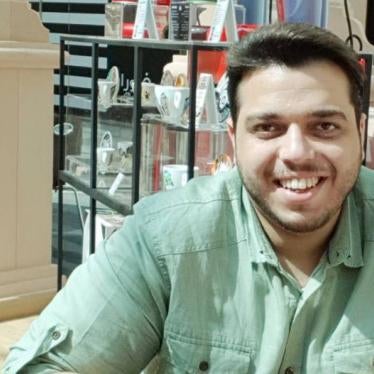(Beirut) – Qatari authorities and FIFA should insist that a whistleblower at the heart of Qatar’s 2022 World Cup organization gets a fair trial as the case heads to Qatar’s final court of appeal, Human Rights Watch and FairSquare said today.
Analysis of the judgment of the appeal court, which upheld Abdullah Ibhais’ conviction on December 15, 2021, further reveals serious violations of his right to a fair trial, compounding the due process violations in his lower court trial.
“While it is Abdullah Ibhais who has been on trial, it is the Qatari justice system that should be scrutinized following such flawed judgments,” said Michael Page, deputy Middle East director at Human Rights Watch. “The Qatari justice system is responsible for protecting the rights not just of Ibhais, but of thousands of people connected with the World Cup.”
Ibhais’ family members have told Human Rights Watch and FairSquare that he plans to appeal his conviction for bribery at Qatar’s Court of Cassation on the basis that the court based his conviction on a tainted confession. Ibhais has previously said that he believes the case was in retaliation for his internal criticism of the handling of a migrant workers’ strike in Qatar in August 2019. The case was initiated after Qatar’s World Cup organizers alleged that Ibhais had harmed state security.
Ibhais was convicted on charges of “bribery,” “violation of the integrity of tenders and profits,” and “intentional damage to public funds.” The charges against Ibhais and two other defendants – his brother, who lives in Turkey, and another man believed to be a Saudi citizen – relate to a Supreme Committee tender for social media services.
The appeal court judgment confirms that the only inculpatory evidence the court considered against Ibhais is his confession, which he retracted in court. He says it was extracted under threat and coercion, and during interrogations for which he was denied the presence of a lawyer. The appeal court judgment acknowledges Ibhais had no lawyer present when he made his confession but referenced documents that claim Ibhais did not say who he wanted to represent him leading the prosecution to proceed with his interrogation without a lawyer present.
However, the public prosecution’s investigation record for November 14, 2019, two days after his arrest, says that Ibhais pointedly asked the authorities to facilitate a meeting with a lawyer.
Analysis of the judgment also reveals that the appeal court refused a request from Ibhais’ lawyer, whom he was only able to hire later nine days after his initial arrest, to demand that prosecutors present evidence that his former employers have claimed implicates Ibhais in wrongdoing. The evidence was not introduced or examined in his first trial and his former employers have never made it public. The court did not consider this evidence, the judgment shows.
Ibhais’ lawyer also asked the appeal court to review the evidence that the Supreme Committee claims exists as proof of Ibhais’ wrongdoing – voice notes, video recordings, and WhatsApp messages between Ibhais and other defendants in the trial. But the appeal court refused, saying that it was satisfied with the evidence provided to the Court of First Instance despite the fact that the Court of First Instance did not consider this evidence, as detailed in a previous statement from Human Rights Watch and FairSquare.
Human Rights Watch and FairSquare have seen a police report that summarizes the information provided to the police by the Supreme Committee. The report refers to the contents of a complaint submitted to the Qatari Criminal Investigations Directorate by the Supreme Committee in relation to what it describes as “a leak of information” pertaining to a tender for a social media contract. The complaint draws a link between Ibhais and two other people, his brother in Turkey and a prominent media figure who the report says “is believed to be a Saudi citizen.”
Ibhais previously was Arabic-language media manager for Qatar’s 2022 FIFA World Cup organizers, the Supreme Committee for Delivery and Legacy. Before Qatari authorities detained him in December, he told Human Rights Watch and FairSquare that he believes the case against him was in retaliation for his criticism of the handling of a migrant workers’ strike in Qatar in August 2019. He says his stance is what led the Supreme Committee to hand over highly sensitive allegations to the Qatari authorities in which they expressed suspicions that Ibhais was engaged in activities aimed at “harming the state or its security.”
Qatari authorities arrested Ibhais on November 12, 2019, shortly after the Supreme Committee passed on the information. He told Human Rights Watch and FairSquare that in the days following his initial arrest that his interrogators coerced him into signing a confession by threatening him with serious state security charges if he did not confess to the lesser charge of bribery and misuse of state funds.
The court of appeal judgment shows that the court failed to uphold Ibhais’ right to a fair trial, repeating a failure in the original judgment by refusing to order an investigation into his allegations of a coerced confession. The appeal court, as with the court of first instance, ruled that it was satisfied with the integrity of Ibhais’ confession during questioning. The court said that it trusted that the confession was true, and that it was given freely and consciously, despite Ibhais’ explicit claim to the contrary and the lack of any official investigation into his claims.
“The refusal of the court to oblige the as-yet-unseen evidence to be presented in court and open to challenge, compounds their failure to afford him a fair trial,” said Nicholas McGeehan, co-director of FairSquare.
FIFA’s public response to Ibhais’ ordeal, which Ibhais also reported directly to FIFA via its whistleblowing platform on September 21, has been a short statement issued on November 8 stating that “It is FIFA’s position that any person deserves a trial that is fair and where due process is observed and respected.”








